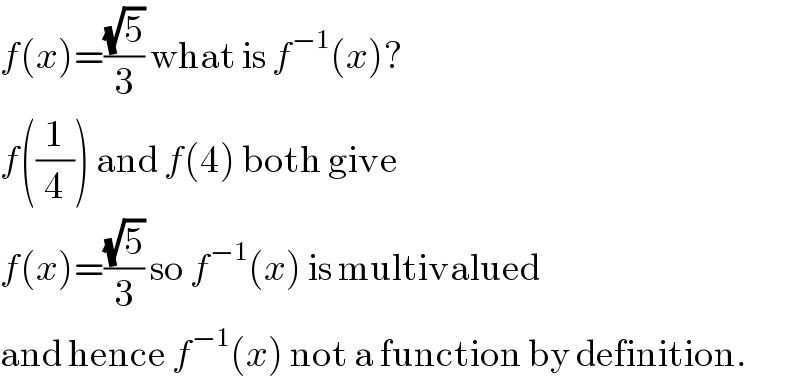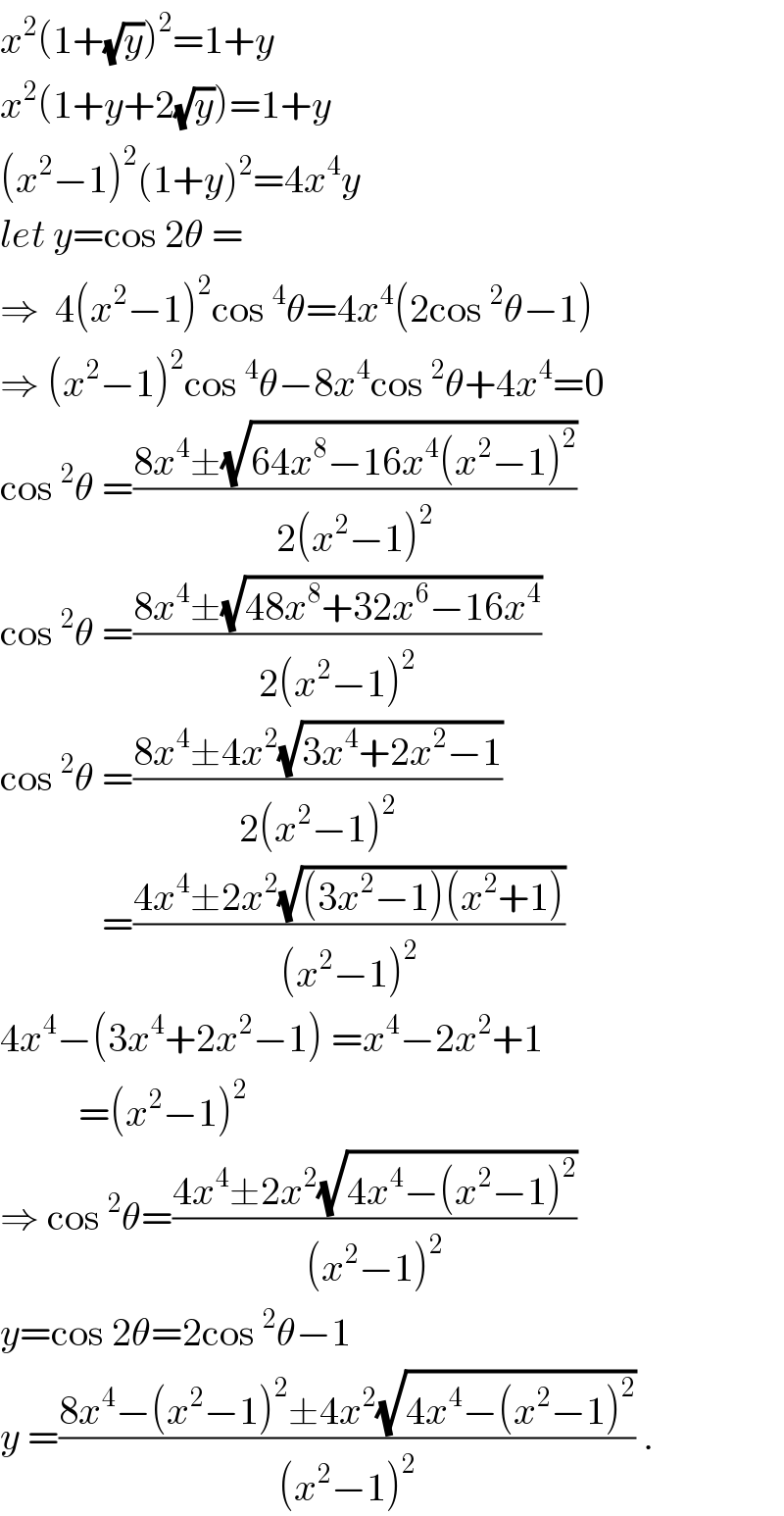
Question and Answers Forum
Question Number 37089 by behi83417@gmail.com last updated on 08/Jun/18

Commented by math khazana by abdo last updated on 09/Jun/18
![1) f id defined on [0,+∞[ f^′ (x)= (((1/(2(√(1+x))))(1+(√x)) −(√(1+x))(1/(2(√x))))/((1+(√x))^2 )) = ((2(√x)(1+(√x))−2(1+x))/((1+(√x))^2 )) = ((2(√x) +2x −2−2x)/((1+(√x))^2 )) =((2((√x)−2))/((1+(√x))^2 )) if x≥4 f^′ ≥0 and f is increazing f([4,+∞[)=[f(4),f(+∞)[ =[((√5)/3) ,1[ if 0≤x≤4 f is decreasing so f ([0,4])=[f(4),f(0)] =[((√5)/3),1]](Q37094.png)
Commented by math khazana by abdo last updated on 09/Jun/18

Commented by math khazana by abdo last updated on 09/Jun/18
![3) let I = ∫_0 ^1 ((√(1+x))/(1+(√x))) dx changement (√x)=t give I = ∫_0 ^1 ((√(1+t^2 ))/(1+t)) 2t dt =2 ∫_0 ^1 (t/(1+t))(√(1+t^2 )) dt =2{ ∫_0 ^1 (√(1+t^2 )) dt −∫_0 ^1 ((√(1+t^2 ))/(1+t))dt } ∫_0 ^1 (√(1+t^2 )) dt =_(t=sh(u)) ∫_o ^(ln(1+(√2))) ch(u)ch(u)du =(1/2) ∫_0 ^(ln(1+(√2))) (1+ch(2u))du =(1/2)ln(1+(√2)) +(1/4) [sh(2u)]_0 ^(ln(1+(√2))) but sh(2u) =((e^(2u) +e^(−2u) )/2) ⇒ sh(2ln(1+(√2)) = (((1+(√2))^2 +(1+(√2))^(−2) )/2) ⇒ ∫_0 ^1 (√(1+t^2 ))dt = (1/2)ln(1+(√2)) +(1/8){ (1+(√2))^2 +(1+(√2))^(−2) } letfind ∫_0 ^1 ((√(1+t^2 ))/(1+t)) dt chang. t=sh(x) give ∫_0 ^1 ((√(1+t^2 ))/(1+t)) dt= ∫_0 ^(ln(1+(√2))) ((ch(x))/(1+sh(x))) ch(x)dx = ∫_0 ^(ln(1+(√2))) (1/(1+sh(x))) ((1+ch(2x))/2) dx =(1/2) ∫_0 ^(ln(1+(√2))) ((1 +((e^(2x) +e^(−2x) )/2))/(1+ ((e^x +e^(−x) )/2))) dx =(1/2) ∫_0 ^(ln(1+(√2))) ((2 +e^(2x) +e^(−2x) )/(2+e^x +e^(−x) )) dx =_(e^x =t) (1/2) ∫_1 ^(1+(√2)) ((2 +t^(2 ) +(1/t^2 ))/(2 +t +(1/t))) dt =(1/2) ∫_1 ^(1+(√2)) ((2t^2 +t^4 +1)/(2t +t^2 +1)) (1/t) dt =(1/2) ∫_1 ^(1 +(√2)) ((t^4 +2t^2 +1)/(t^3 +2t^2 +t)) dt =(1/2) ∫_1 ^(1 +(√2)) ((t(t^3 +2t^2 +t) −2t^3 +t^2 +2t^2 +1)/(t^3 +2t^2 +t)) dt =(1/2) ∫_1 ^(1+(√2)) t dt +(1/2) ∫_1 ^(1+(√2)) ((−2t^3 +3t^2 +1)/(t^3 +2t^2 +t))dt =(1/4){ (1+(√2))^2 −1} +(1/2) ∫_1 ^(1+(√2)) ((−2(t^3 +2t^2 +t)+4t^2 +2t +3t^(2 ) +1)/(t^3 +2t^2 +t)) =(1/4){2−2(√2)) −1((√2)) +(1/2)∫_1 ^(1+(√2)) ((7t^2 +2t +1)/(t(t^2 +2t +1)))dt let decompose F(t) = ((7t^2 +2t +1)/(t(t+1)^2 )) F(t) = (a/t) +(b/(t+1)) +(c/((t+1)^2 )) ....be continued...](Q37096.png)
Commented by behi83417@gmail.com last updated on 09/Jun/18

Commented by prakash jain last updated on 09/Jun/18

Commented by behi83417@gmail.com last updated on 09/Jun/18

Commented by prakash jain last updated on 09/Jun/18

Commented by math khazana by abdo last updated on 09/Jun/18

Commented by prakash jain last updated on 10/Jun/18

Commented by math khazana by abdo last updated on 10/Jun/18

Answered by ajfour last updated on 09/Jun/18

